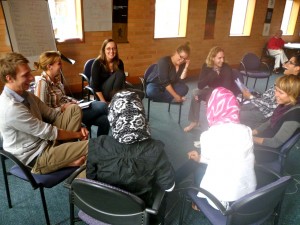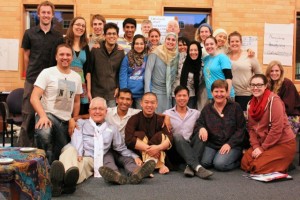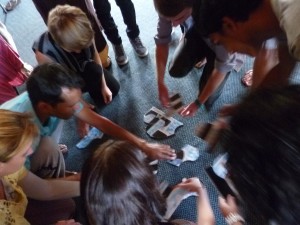2 April – 7 April 2017
THE CHALLENGE
Every generation has its challenges to face and ours is no different. We face crucial social, political, military, economic and ecological challenges, some of which pose substantial threats to a healthy future for our humanity. Our pages in history are being written now. What kind of people might it take for these pages to read that our generation seriously engaged the violence, intolerance and injustice present in its lifetime?
We believe it is going to take young people who are:
- Skilled in nonviolent leadership,
- Highly motivated towards interfaith dialogue and cooperation
- Aligned with their identity and purpose at this time in history,
- Strong and committed to their spirituality,
- Deeply grounded with skills in self care
- Able to stand firm for the reality of nonviolence, tolerance and justice for our shared communities.
THE NONVIOLENT INTERFAITH LEADERSHIP PROGRAM is designed to cultivate these capacities in you.
THE COURSE
 epen their leadership potential and expand their capacity to make vital contributions to their community and the world.A team of highly skilled, richly experienced and deeply spiritual facilitators will guide participants through a 5 day retreat
epen their leadership potential and expand their capacity to make vital contributions to their community and the world.A team of highly skilled, richly experienced and deeply spiritual facilitators will guide participants through a 5 day retreat
- The Inner and Outer Journey of Nonviolent Leadership
- The Tool-Kit For Nonviolent Leadership
Participants will receive intellectual, emotional and spiritual nourishment as they engage in a daily rhythm that will include time for: transformative course content, spiritual practices, journaling, artistic expression, shared meals, silence, small and large interfaith group sharing and the development of practical toolkits for nonviolent leadership.
A significant aspect will be applied learning via a community project developed by each participant in his or her individual faith community. Members of the project team will provide supervision and mentoring as required throughout this time.
Effective leadership can only emerge from, and be sustained by, a foundation of self-understanding. Without an awareness of the light and shadow that drive our unique personalities we unconsciously repeat the myth of redemptive violence that is dominant in our culture. (Brendan McKeague and George Trippe)
THE CONTENT
Course content will be shaped around a unique and integrated combination of both ‘inner’ and ‘outer’ topics including nonviolent leadership; spiritual formation; interfaith dialogue; identity, culture and belonging; self care and participation in society. The program will provide skills for putting into practice the insights of living nonviolently.
Unit 1: Gathering and Grounding in a Culture of Co-Learning – Sharing Stories
Participants will be given the opportunity to:
- Share personal stories – What brings you to this place?
- Share stories of connection within faith traditions – What sustains you in your faith?
- Reflect on the experience of community
- Begin to engage the experience of the community within
Unit 2: Dominant Culture: Social and Personal Impacts
Participants will interactively explore:
- The formation and maintenance of groups and subcultures within society

- How the cycles of violence are legitimised, validated and perpetuated
- The pervasive nature of dominant culture for the individual
- Characteristics of spiritualities that perpetuate violence
- Key characteristics of nonviolent spiritualities
Unit 3: Nonviolence in my Faith Tradition
Participants will be encouraged to:
- Explore the connection between culture and faith
- Engage in critical self-reflection on the interface of culture and faith
- Think about strategic nonviolent alternatives for living

- Reflect on their faith traditions and
- Self-understanding
- An understanding of Others as neighbours
- Experiences of Transformation
- Consider project development: How will I address extreme ideologies of violence?
Unit 4: Practical Skills for Nonviolent Living
Participants will learn about and explore:
- 5 skill sets for personal, interpersonal and social engagem
 ent in nonviolent communication
ent in nonviolent communication - Individual principles which support nonviolent living and communication
- Spiritual practices to sustain nonviolent living and communication
Unit 5: Next steps for Personal and Project Development
Participants will be invited to:
- Engage with a nonviolent self-organising process (Open Space Technology)
- Begin to create projects designed to increase the capacity of their local communities to provide alternatives to violence
- Begin to organise networks of support and ongoing learning with each other


You must be logged in to post a comment.